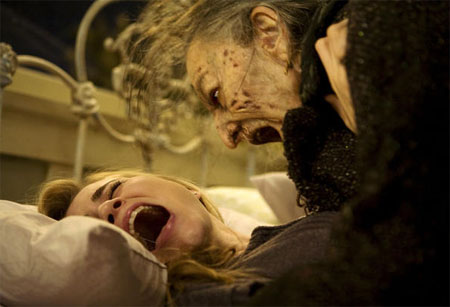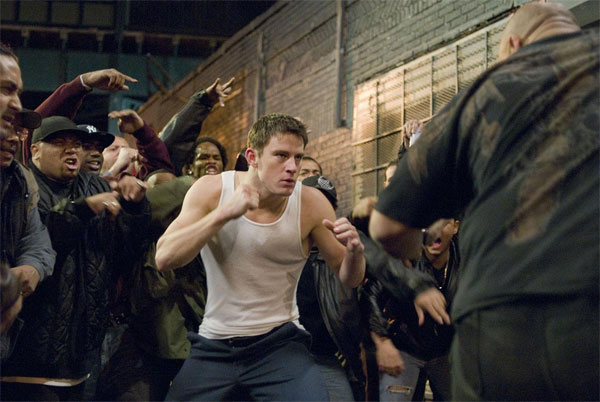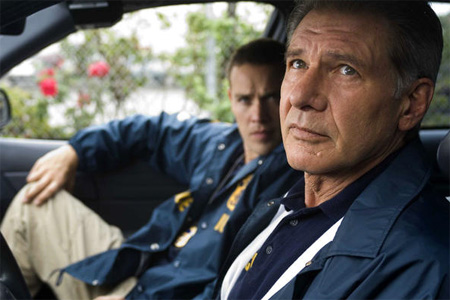
There’s a Preston Sturges comedy trapped inside Extract‘s enjoyable mess. This is a movie that the New York critics did not seem to appreciate. But if they end up hating this film, don’t listen to them. Even if Extract is imperfect, this is the right step forward for Mike Judge. Extract doesn’t quite match the laughs in Judge’s two previous live action features, but Judge has atoned for this by growing up a bit.
Judge’s central character is Joel Reynolds (Jason Bateman), a married thirtysomething who manages an extract factory but who, like the many seemingly well-educated couples in Idiocracy, hasn’t yet sired children. Back in the day, Joel got lucky with an old family recipe and worked his almond innovations into a money-making winner through his background in chemistry. (The great joke here is that none of the supporting characters who dream of riches are interested in learning how Joel found his ostensible fortune. But with a potential buyout from General Mills, they do seem to think he has more money.) Joel is often sympathetic to his workers. He’s willing to attend one of his worker’s fusion guitar shows. But he’s clearly no Marxist. (While Joel tolerates his workers’ eccentricities, perhaps more so compared with present workplace realities, there’s no indication here that the workers are unionized.) He does, after all, live in a gated community. His house, rather amusingly, doesn’t resemble anything close to a McMansion. One can easily imagine a nearly identical home just outside the gates.
Joel’s home may be his castle. But the patriarchal remnants of English common law don’t stop with his mortgage. His wife, Suzie, puts on her sweatpants at 8:00 PM every night, tying them up like a 21st century chastity belt, and Joel needs to get home fast if he hopes to get some action. He never does. Their relationship and sex life is a mess. And Joel lacks the royal effrontery to tell Suzie that he finds the sweat pants distasteful. The two never think of communicating directly with each other. Dancing with the Stars is the bigger draw. Indeed, Bowling Alone author Robert D. Putnam would probably have a field day with this film, seeing as how most of the problems arise because nobody thinks of directly communicating with each other.
Is this a cartoonish depiction of American domestic life? Even accounting for Judge’s animation background, not quite. This is also a film in which the wonderfully lively character actor J.K. Simmons plays it straight. There are skirmishes with opportunistic interlopers who can’t use the English language. (One makes a sad attempt to use “referral” as a verb.) Well-meaning but socially inept figures try to hold onto a sense of community rooted in Eisenhower-era community. And these social throwbacks are the only thing left. Joel’s neighbor Nathan mercilessly (and hilariously) hectors the Reynolds into buying tickets for a Rotary Club dinner. David Koechner plays Nathan like a cross between Stephen Root’s Milton and Gary Cole’s Bill Limbergh. While the New York intellectual type may quibble with Judge resorting to such archetypes, the truth of the matter is that anybody who has done time in the suburbs has encountered a guy like Nathan. Nathan rattles off phrases like “a real loose bunch” and “You know how it is when the wives are talking.” But is Nathan really the problem? Or is Joel?
Much as we might be inclined to declare Nathan a rube, it’s doubtful that he would hire — as Joel does — an unqualified gigolo to impersonate a pool boy and make the moves on his wife to test her fidelity. (I don’t want to give away the results, but I will say that this plan emerges because Joel spends much of his time hanging around a spacey bartender played by Ben Affleck. And what is more pathetic? The seductive plan that mirrors the most cliched porn formula imaginable? Or the fact that anybody signs on to test such a bullshit hypothesis?)
The film’s view of middle-class life is presented as a flat series of unadventurous incidents centered around dull routine, and the apparent excitement comes through a con artist named Cindy played by Mila Kunis, who may be the most problematic character in the film. Her get-rich-quick scheme relies almost entirely on the fact that the people she exploits are stupid. And not just stupid, but stupid beyond stupid. We are introduced to Cindy stealing a guitar at the beginning and we are asked to believe that a guitar shop would not, as most guitar shops do, have a person at the front checking the merch. This exceeds reality.
But Judge isn’t entirely contemptuous of the slow-witted, well-meaning, and prejudicial naifs that are populating his films with greater frequency. His work here, much like Idiocracy, wavers interestingly between populist comedy and quasi-elitist sentiments. He can never entirely adopt a position one way or the other, and this is what makes Judge’s work intriguing. He’s the only film comedy director who can momentarily convert a populist audience into elitists, but without anyone feeling terribly bad about it. And that’s because his seemingly one-dimensional characters possess interesting ironies. Take Extract‘s Step, an employee at Joel’s factory who hopes to live up to his name by securing the coveted floor manager position. He seems to think that his many years at Reynolds Extract will count in lieu of his professional capabilities. But after he suffers an accident that splices half his manhood, he isn’t interested in suing the factory. Step’s litigious impulses emerge not because of his inherent nature, but because of Cindy’s coercion, as well as an ambulance-chasing attorney (suitably played by the obnoxious Gene Simmons).
It’s worth pointing out that if Idiocracy is the end result of the current American one-two punch of entitlement and stupidity, then Extract serves to chronicle the present conditions. Characters may wrap their lips around a two-liter bottle of soda and guzzle it down, even ordering more soda from Domino’s out of laziness. But can we talk to them?
In age in which desperate men carry submachine guns to town hall meetings, Extract suggests that part of the solution may involve listening to these alleged rubes, and even hiring them despite their glaring inadequacies. The elitists who think that this film may be another laugh riot at the expense of the unwashed masses may be greatly disappointed that Judge has the stones to defy their prejudicial expectations. That, in itself, may be the quiet and possibly unintentional riot.







